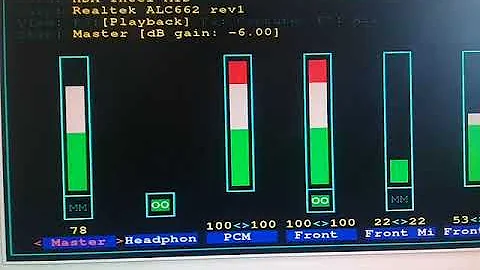How to make Alsa pick a preferred sound device automatically?
Solution 1
Find your card with
$ cat /proc/asound/cards
To get valid ALSA card names, use aplay:
$ aplay -l
and then create /etc/asound.conf with following:
pcm.!default {
type hw
card 1
}
ctl.!default {
type hw
card 1
}
Replace "card 1" with the number or name of your card determined above.
Alternatively, you can change ordering of your cards so your USB card will be card 0 and it will work without editing asound.conf.
Solution 2
this is the method for selecting default sound card in Alsa. You may want to install Alsa for this method to work if you are using Pulse Audio.
cat /proc/asound/modules
will list your sound modules .The output of the command will be like this (eg):
0 snd_hda_intel
1 snd_usb_intel
you can pretty easily understand which one is your usb sound card from above.
nano /etc/modprobe.d/alsa-base.conf
edit this alsa-base.conf in such a way that your preferred card has an index =-2 / 0 and the other card has index =-1 / 1 (stick with -2 and -1 )
options snd_hda_intel index=-1
options snd_usb_intel index=-2
in this case usb device is preferred device.
if you are having two differnt cards with same name from the output, like this:
options snd_hda_intel
options snd_hda_intel
issue this command to find out which is which:
cat /proc/asound/cards
then edit modules in this way:
options snd_hda_intel enable=1 index=0
options snd_hda_intel enable=0 index=1
a reboot may be necessary.so you might have to manually switch over your sound cards.
Solution 3
The answer from Matija Nalis only half worked for me (alsamixer changed default, but other things like aplay and firefox stubbornly stuck with the wrong default). This example from the debian wiki worked for me (on CentOS-6 laptop):
defaults.pcm.!card Generic_1
defaults.ctl.!card Generic_1
defaults.pcm.!device 0
defaults.ctl.!device 0
For the record: ALSA is poorly documented, and especially this very simple stuff like selecting which card to use is way too hard. Worse, it seems to change between systems. Also, I got that "Generic_1" tag from aplay -l where it comes up as "card 1" in the list. Other people seemed to be using it, so I did the same... what it means I cannot say.
Solution 4
Here is a variant of Matija Nalis and Tel's answers. This is what worked for me:
~/.asoundrc
defaults.pcm.!card 1
defaults.ctl.!card 1
(Odroid C0, Debian Jessie, HDMI audio as card 0 and USB Sound Card as card 1 according to aplay -l)
Note: other methods did not work for me, as /proc/asound/modules does not exist and there is no hdmi audio module to blacklist or put to low priority, it is embedded into the kernel. It seems I would have had to recompile the kernel without hdmi audio support to disable it completely.
Solution 5
While you can change the default alsa card by editing .asoundrc or the system asound.conf there are a couple of significant issues with this approach.
It's fragile, and requires application restarts to be honored.
If you want to switch cards on the fly then you really need to use a soundserver that abstracts the applications from the soundcard correctly such as pulseaudio.
Related videos on Youtube
Petr
Updated on September 18, 2022Comments
-
Petr almost 2 years
I bought an USB sound card. I'd like to set up my Linux desktop so that it prefers the USB device, if it is plugged in and automatically switches as the device is (un)plugged. Is it possible, and how?
-
Petr almost 11 yearsWhat do you mean by "modifying the output"? How can I modify the output?
-
Petr almost 11 yearsI tried your suggestion, but when the USB card is unplugged, audio stops working completely, instead of switching to the built-in card.
-
 Ashildr almost 11 yearsi have made necessary changes in the answer.try this version.hope this helps.the methods may vary according to the flavour of linux you use.
Ashildr almost 11 yearsi have made necessary changes in the answer.try this version.hope this helps.the methods may vary according to the flavour of linux you use. -
Petr almost 11 yearsThank you. How can I verify the setup? I identified the cards, added the appropriate options, rebooted, but I don't see any change - still the internal (intel) card is the preferred one.
-
 Ashildr almost 11 yearstry >options snd-usb-intel enable=1 index=0 (to enable) >options snd-hda-intel enable=0 index=1 (to disable) or >options snd-hda-intel enable=0 index=0 >options snd-usb-intel enable=1 index=1 and reboot
Ashildr almost 11 yearstry >options snd-usb-intel enable=1 index=0 (to enable) >options snd-hda-intel enable=0 index=1 (to disable) or >options snd-hda-intel enable=0 index=0 >options snd-usb-intel enable=1 index=1 and reboot -
 Ashildr almost 11 yearsi.e, enable usb disable the other one using enable =0 or 1,do this vice versa also.i'm not sure which will work for you.reboot is necessary.i wish u solve yor problem
Ashildr almost 11 yearsi.e, enable usb disable the other one using enable =0 or 1,do this vice versa also.i'm not sure which will work for you.reboot is necessary.i wish u solve yor problem -
Petr almost 11 yearsI'm confused - why would I disable one of the sound cards? Then, if I unplug the USB one, I'd have to enable the internal one manually by changing the configuration file again?
-
 Ashildr almost 11 yearsthe above method is to choose a particular order for multiple installed cards.And this indeed depends upon the flavour and version of linux being used in the system. for eg:some of the older linux systems use the "index" method we described above.where as newer linux systems tend to use another more recent method involving "slots".since you said there wasn't visible changes after changing the index ,i wanted to test wheather the "index" method worked at all.you can gain more insights into configuring advanced controls in alsa via this link.hence i asked to disable one device.
Ashildr almost 11 yearsthe above method is to choose a particular order for multiple installed cards.And this indeed depends upon the flavour and version of linux being used in the system. for eg:some of the older linux systems use the "index" method we described above.where as newer linux systems tend to use another more recent method involving "slots".since you said there wasn't visible changes after changing the index ,i wanted to test wheather the "index" method worked at all.you can gain more insights into configuring advanced controls in alsa via this link.hence i asked to disable one device. -
 Ashildr almost 11 years
Ashildr almost 11 years -
pilona almost 11 yearsThis requires one to be superuser, which most people will have. Where should one look though for something that can be done as a regular user?
-
 Rob Gibbons over 8 yearsUsing a RPI2, this solution worked for me. Tried all the rest, but nothing worked until I did this one. (Had to use "card 0" on mine).
Rob Gibbons over 8 yearsUsing a RPI2, this solution worked for me. Tried all the rest, but nothing worked until I did this one. (Had to use "card 0" on mine). -
linuxdev2013 almost 8 yearssudo modprobe $soundcard_driver would do what you desire for /proc/asound/modules
-
astooooooo almost 8 years@linuxdev2013 how could you modprobe a driver that is not modprobe-able? As explained above, it is not a module, it is embedded in the kernel.
-
abchk1234 about 7 yearsUsing the above configuration, sound in youtube on palemoon did not work for me, this config worked:
defaults.pcm.card 1 defaults.ctl.card 1forum.palemoon.org/viewtopic.php?t=9661#p66016 -
 alamin about 7 yearsstucked for this one day! and you just saved my ass!
alamin about 7 yearsstucked for this one day! and you just saved my ass! -
 Max N almost 7 yearsSome applications like Skype beta ignore that though and connect to the default ALSA card. That results in no audio for Skype when HDMI is the first device instead of HDA.
Max N almost 7 yearsSome applications like Skype beta ignore that though and connect to the default ALSA card. That results in no audio for Skype when HDMI is the first device instead of HDA. -
Szczepan Hołyszewski over 5 yearsDON'T use esoteric batch processing hackery in answers to normal people. Instead of writing a one-liner that extracts columns from output, describe in words how to find the desired information in the full output.
-
starbeamrainbowlabs almost 5 years@SzczepanHołyszewski Absolutely. While offering it as an option is great, the output format has changed for me - and now it's just outputting
Device. -
Paul Slocum over 4 yearsDoesn't work for me on the Raspberry Pi. It's not clear what the device "name" is from the aplay output, but I've tried everything the name could be and it always tells me the asound.conf is corrupt unless I just put "card 0" or "card 1"
-
ironchicken over 4 yearsThis worked for me too. Although I just used
.!card 1rather thanGeneric_1. -
 Vitaly Zdanevich over 2 years
Vitaly Zdanevich over 2 years/proc/asound/modulesis not exists.




